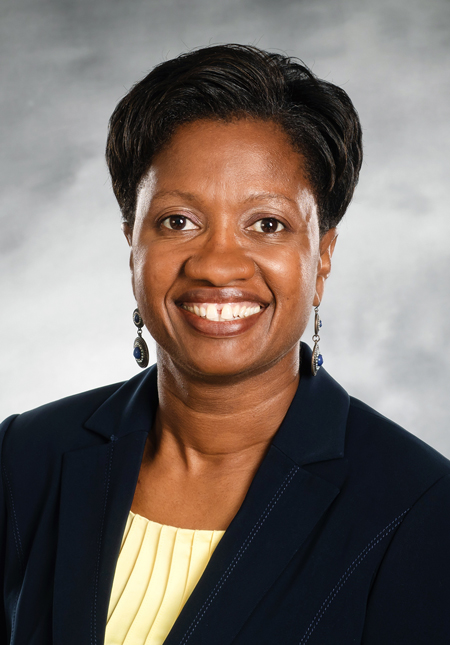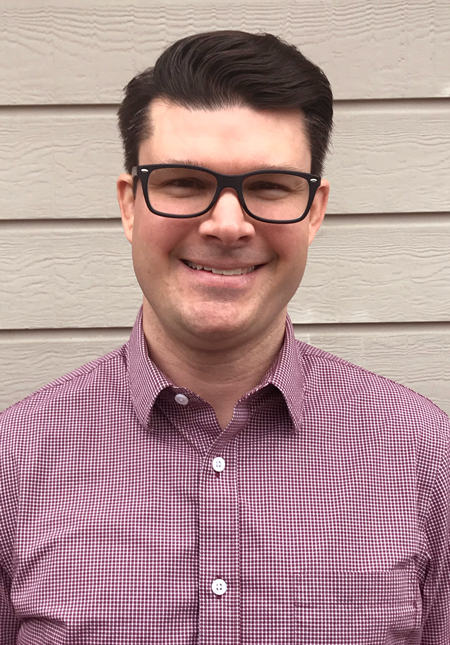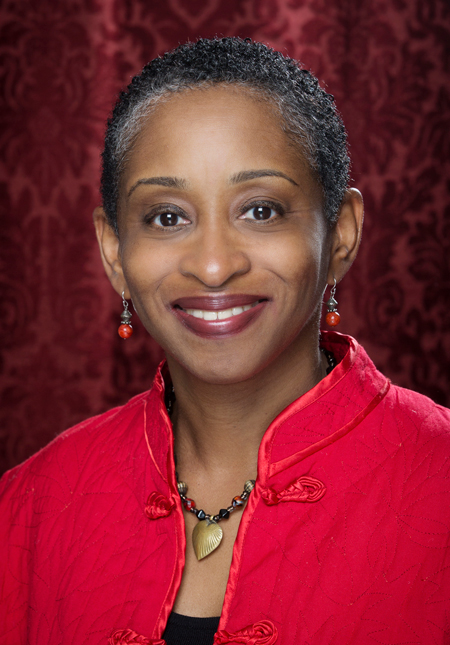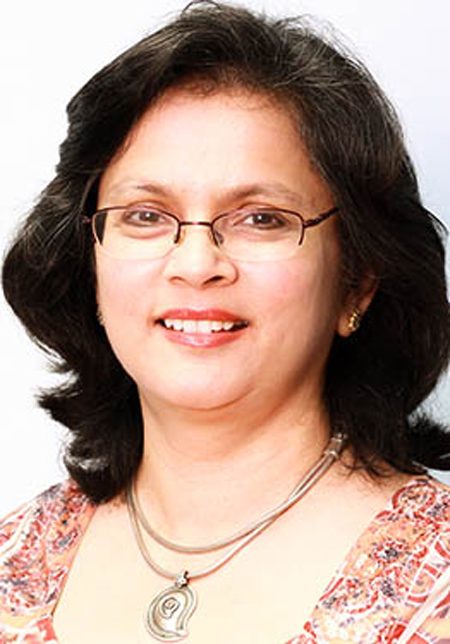
UNC Greensboro’s Thomas Undergraduate Research Expo is coming up April 19 – this year, virtually – and it’s also time to honor the faculty mentors who have helped and inspired students along the way, engaging them in real-world scholarship and helping them fine-tune their research skills.
Dr. Laurie Wideman received the Outstanding Faculty Mentor Award, announced earlier this year.
For the Thomas Undergraduate Research Mentor Award, faculty members were honored in three categories: non-tenure track, pre-tenure, tenured. One faculty member was named the winner of the Advising Excellence Award.
View their video feature here and read about their work below, and how students recall their support.
Thomas Undergraduate Research Mentor Award
Non-tenure track: Dr. Aileen Reid, School of Education, Educational Research Methodology

Dr. Aileen Reid approaches research, teaching, and mentoring through the lens of her lived experiences, her commitment to social justice, and her desire to transform the educational research and policy landscape. Her current research centers on diversity, equity, and inclusion in higher education as it relates to faculty, first-generation students and students from low SES backgrounds, and STEM education. Dr. Reid teaches classes on research methodology, assessment and program evaluation, and she co-directs the UNCG STEM (Science, Technology, Engineering, and Mathematics) Laboratory (SPEL), a subunit of the Office of Assessment Evaluation and Research Services. Under her guidance, undergraduate students investigate the impact of efforts to broaden participation of underrepresented and minoritized groups in STEM. Over the past two years, she has worked with six undergraduate psychology students on nine research and evaluations of STEM education projects funded by the National Science Foundation. In her lab, undergraduate students are mentored by graduate students in qualitative and quantitative research and other technical skills, and in co-authoring technical evaluation reports. Undergraduate students also participate in weekly professional development on diversity, equity, and inclusion, anti-racism, and social justice. In 2020, one of her mentoring contributions was to help prepare undergraduate and graduate students for the NCARE (North Carolina Association for Research in Education) 2020 conference in Greensboro.
“Dr. Reid’s deep commitment to professionalism, excellent interpersonal skills, resourcefulness, pleasantness, and ability to communicate with students from diverse backgrounds kept students grounded and focused throughout the preparatory process for the NCARE 2020 conference presentation. It was my first time presenting and I ultimately felt prepared, due in part to the mentorship from Dr. Reid…. She works hard to balance a student-centered approach which is responsive towards building interests, skillset, peer support and celebrating successes of undergraduate students under her tutelage on the one hand, and her supervisory role of graduate assistants and teaching assistants on different projects within SPEL. Dr. Reid creates opportunities for her undergraduate students to assume leadership roles on assigned project teams including creating interview protocols, evaluation surveys, and uploading them in UNCG Qualtrics, transcriptions of focus group data, making simple statistical tables, and analyses, and writing evaluation and research memos.”
-Sharon Ladokun ‘20
“When I first interviewed to join SPEL, I was a freshman with very little research experience. Despite my lack of experience with the process of evaluation and research, Dr. Reid was always kind and extended whatever knowledge and resources that I needed. From my very first day in the lab, she expressed great interest in fostering and developing the skills needed for my future career. With Dr. Reid’s mentorship, I have expanded my knowledge of the process of program evaluation and research. I now have the skills to conduct a proper literature review, fill out observation reports, and to collect and analyze data that I have obtained through procedures such as interviews. My time with Dr. Reid has given me many of the tools I will need as I pursue my aspiration of becoming an industrial-organizational psychologist. Dr. Reid’s kindness has been the true highlight of my experience as her mentee. Initially, being the youngest and most inexperienced person in our lab was highly intimidating. Regardless, Dr. Reid has always created an environment where I did not have to be afraid to share my lack of knowledge but instead encouraged me to ask questions and to grow. Her kindness has truly helped me grow more confident in my abilities and embrace the potential that I have. I firmly believe that you will not find another person like Dr. Reid who is welcoming and willing to help those who are as inexperienced as I was… She has left a very special mark on me during my time as an undergraduate student and I know she will continue to do so for many others.”
-Caraline Malloy ’23
Early Career (pre-tenure): Dr. Chris Wahlheim, College of Arts and Sciences, Psychology

Dr. Chris Wahlheim is a cognitive psychologist with expertise in memory, metacognition, and cognitive aging. He teaches undergraduate courses in cognitive psychology and human memory, and graduate seminars in everyday cognition, and memory and aging. He directs the Memory and Cognition Lab, which examines human episodic memory including research in episodic memory updating, beliefs and memory in fake news corrections, exercise effects on memory acuity, and age differences in memory organization. His work, which is carried out with collaboration from graduate and undergraduate students, appears in top journals in his field, such as Psychological Science, Journal of Experimental Psychology: General, and Proceedings of the National Academy of Sciences. Dr. Wahlheim mentors McNair scholars and MARC U STAR fellows and guides them in taking an active role in the research lab. Undergraduates become immersed in the research environment through frequent meetings with Dr. Wahlheim and graduate students, and they are supported in their work on sponsored projects and honors theses.
“What I loved the most about him as a mentor was that he allowed room for independent work while providing a moderate amount of structure. For instance, I had the opportunity to not only work independently by preparing IRB documentations and building the program for my Honors Thesis through modeling after previous lab experiments but also work collaboratively with Dr. Wahlheim to design the study and formulate hypotheses. Along the lines of collaborative work, it is very important to me as a mentee to have a mentor who welcomes different opinions, even if those of the mentee diverge from their own, and who listens intently when the mentee shares their opinions. Dr. Wahlheim effortlessly accomplished this: various opinions I provided on the project during our meetings were always seriously considered and were often incorporated to the study design and protocols. If my proposed idea wasn’t something that was achievable, he always explained why and how we could modify that idea to make it achievable… Joining Dr. Wahlheim’s lab was indeed a pivotal moment in my undergraduate career. Under his mentorship, I was able to develop rigorous scientific skills that are foundational to conducting research as well as grow further as a junior scientist, who now has the potential to conduct more complex experiments through the acquisition of a well-rounded and comprehensive research background.”
-Ei (Crystal) Thinzar ’20
“When I first began working in the Memory and Cognition Lab (MAC lab), I was really nervous about conducting research and all of the processes that went into keeping track of records and important information. Dr. Wahlheim, graduate students, and other lab assistants were very patient as I was still getting into the swing of things. I first knew that Dr. Wahlheim cared about my success as a student when on my second day there he asked me, ‘What do you hope to gain from working in my lab?’ I very plainly answered that I was interested in just gaining research experience in general. He then proceeded to ask questions to get more at what kinds of projects I would want to be working on. I really appreciated that conversation on my second day because I could tell that he wanted to make sure that I gained experience that was most beneficial to me. The mentorship that I received from Dr. Wahlheim really grew once I was inducted into the Ronald E. McNair Scholars Program. The purpose of this federally-funded program is to prepare underrepresented undergraduate students for graduate school studies. Being a part of this program allowed me to gain even more research experience with Dr. Wahlheim during the summer of 2017. During that summer my relationship with Dr. Wahlheim grew as he was constantly showing me tips and tricks to guide me through the entire research process. Something that really stuck out to me was his patience with me as I was learning many new techniques and software. When I would do something incorrectly he was never quick to criticize negatively. Instead, he would always use things as a learning opportunity so that I never made the same mistake again. Another thing I appreciated about him as my mentor was his honesty. I remember there were many summer days while conducting research that I would get frustrated with any and everything. He could always tell when I was frustrated and he would always say, ‘The research process is a labor of love.’ That phrase stuck with me and is still with me today, as I am now in graduate school and conducting a research project. Lastly, the thing I appreciate about Dr. Wahlheim the most was his ability to be relatable with me. We come from different backgrounds but when we sat down and had a one-on-one talk about graduate school preparation, he was very open and real about his experiences and things I should consider and avoid when searching for graduate programs. That conversation made me realize that we had more in common than not.”
-McKayla Bohannon ’19
Career (post-tenure):
Dr. Sharon Morrison, School of Health and Human Sciences
Dr. Sudha Shreeniwas, Public Health Education and Human Development and Family Studies

For 10 years, Dr. Morrison and Dr. Shreeniwas have worked together to apply a transformational approach to their classroom teaching and mentoring economically and ethnically diverse UNCG undergraduates in research. Their practices align with the School of Health and Human Services (HHS) mission to “prepare new generations of professionals, leaders, scholars, and entrepreneurs [to] enhance the quality of life of individuals, families, and communities.” As teachers and community-engaged scholars, they focus on the health and empowerment of diverse marginalized refugee and immigrant communities, where key contexts include families, ethnic/racial diversity and socioeconomic inequality. Under their guidance student researchers gain exposure to research through their signature programs, “Enablers of HIV testing and prevention in Latinas (NIH funded)”, “The Montagnard Hypertension Project” (family and chronic disease in refugees), “The Montagnard Population Count Project; Refugee Older Adults Needs Assessment” and their individual projects, “ARTmail participation and health of older adults” (Shreeniwas; NEA funded), “Minority and Refugee/ Immigrant Community COVID-19 Response” (Morrison; BCDI funded.) They anchor these programs in principles of community-based participatory research (CBPR), emphasizing communities as co-researchers, and reciprocity by capacity-building for community empowerment.
Dr. Morrison received the UNC Board of Governors Teaching Excellence Award in 2017, as well as the UNCG HHS Community Engagement Award in 2014, which Dr. Shreeniwas also received in 2017. Their CBPR and student engagement was recognized by the International Association for Research Service Learning and Community Engagement’s (IARSLCE) inaugural Community Outcomes and Impacts Award in 2019, enhancing UNCG’s Carnegie classification as a community-engaged institution.

“I was fortunate to hear about the hypertension research project when Dr. Sudha and Dr. M. visited and spoke about the work at a Montagnard church. Some weeks later, I saw Dr. Sudha in the corridor of Stone Building at the University of North Carolina at Greensboro (UNCG) and asked about the project. She invited me to join the student research team. She and Dr. M. were training and sending out students to do community-based research. They organized trainings in biological and survey data collection, database management, data entry; and planned and did educational outreach for Montagnards. They found funding through their grants to financially support me as student researcher and coordinator. They really respected my experience as a leader among the next-generation Montagnard youth. This allowed me to use my language and cultural skills to effectively do behavioral survey data collection on hypertension with adults and at the same time coordinate and educate student research teams so they would be culturally sensitive and respectful when they entered Montagnard homes, neighborhoods and churches. One of the most important aspects of my work was to make connections with Montangard adults who had completed our survey and have them hear about the different findings from our work. I was able to talk to many of my elders about the importance of prevention but also about understanding why it is important to seek primary care even when they think they feel okay. Dr. M. and Dr. Sudha went the extra mile as professors because they worked with students from UNCG and other colleges in Greensboro, and Montagnard community interpreters and professionals to organize free flu shots and free blood pressure screenings for our church congregations. We worked together to plan health fairs at a school and a neighborhood park that involved local doctors and nurses; biology, nursing, health education and nutrition students from UNCG, NC Agriculture and Technical State University (NC A&T), and Guilford College; social service providers; college recruiters; local housing and immigration advocates. We had fun games and activities for children. We had our elders playing Montagnard musical instruments to educate the crown about our cultural traditions. We distributed fresh fruits and seeds for Montagnards to plant gardens. I also benefited from doing presentations about my research to classmates and at community events. I traveled to Canada and co-presented at the Society for Applied Anthropology on a panel organized by Dr. M., Dr. S. and our community advocate, Mr. Andrew Young. I spoke with confidence to an international audience about Montagnards, their culture, resiliency and health, and our partnership with university professors who care and do research about hypertension and other challenges in our community. I am proud also to be one of the authors on the first community-based research paper about our Montagnard Hypertension project.”
-H’Yua Liana Adrong
School specific mentor recognitions were also awarded:
Early Career Undergraduate Research Mentor within the College of Visual and Performing Arts: Dr. Leah Sobsey, School of Art
Career Undergraduate Research Mentor within the College of Visual and Performing Arts: Dr. Heather Holian, School of Art
Career Undergraduate Research Mentor within the College of Arts and Sciences: Dr. Igor Erovenko, Mathematics and Statistics
Early Career Undergraduate Research Mentor within the School of Health and Human Sciences: Dr. Jaclyn Maher, Kinesiology
Advising Excellence Award: Dr. Pamela Ladrow, Senior Lecturer, Department of Psychology
In her role as the director of undergraduate advising for the Department of Psychology, Dr. Pamela Ladrow advises students on how to make the most of their time at UNCG, to explore various career paths, and guides them in creating long-term plans. But her engagement with students goes well beyond advising sessions. Ladrow regularly volunteers for Destination UNCG and Spartan Showcase, and regularly helps with University recruitment through the Phone-A-Thon. In recent years, she has developed and led orientations for transfer students during SOAR.
“Dr. Ladrow has been a very important part of my undergraduate journey and in getting me to where I am today. She truly embodies what advising excellence is at UNCG. I would recommend her to any psychology student, young or old.” – Jordan Anderson
“Dr. Ladrow has always been extremely knowledgeable as my advisor and has always seemed genuinely interested in where I was headed in my undergraduate career. She has always gone above and beyond to make sure I knew all of the opportunities I had because she recognizes a student’s potential and wants them to reach it.” – Laci Gray ’21
Story assembled by Susan Kirby-Smith, University Communications
Photography by Martin W. Kane, University Communications, and courtesy of Aileen Reid, Chris Wahlheim, Sharon Morrison, and Sudha Shreeniwas


